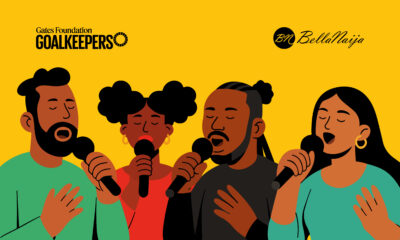Features
Samuel “Samo” Onyemelukwe: Coronavirus and the Nigerian Music Industry

On the 27th of February 2020, the Federal Ministry of Health confirmed the first case of COVID-19 in Nigeria. The World Health Organisation had declared the virus as a pandemic on January 30th of that year, and by April, Nigeria joined the world on lockdown. This disrupted every facet of our civilisation; companies shut down, some had to lay off staff to remain afloat, and the whole world went indoors.
While some companies licked their wounds, others benefited from the pandemic. Platforms like Zoom and Netflix will always look back to the thick of the global lockdown with a sort of schadenfreude because in that same period, their customer base spiked and their revenues surged.
But what was the impact of the pandemic on the Nigerian music industry? Well, for the Nigerian music industry, the impact of COVID-19 was drastic and revealing.
On March 21, 2020, Brymo, a Nigerian alternative artist, announced the postponement of his live concert scheduled for March 28, just seven days interval. Not just him, Teni also had to call off her April 13th show.
This indefinite pause – or better put, disruption – had a negative, if not devastating, impact on their revenues. The cancelled concerts and live shows put a dent in the pockets of these artists, much less the supporting staff and add on businesses whose bread and butter are derivatives of the musical value chain. And this was the fate of many Nigerian artists who had to cancel shows, tours and concerts because of a pandemic that took everyone by surprise.
Why, you ask?
The workings of the Nigerian music industry, unlike more established counterparts, is predominantly physical and only allows for limited number of revenue streams for artists. Back in the era of CDs, while their Western and even South African contemporaries were making reasonable income from their recorded works, Nigerian artists were dealing with another type of pandemic: piracy.
Imagine being a musician and trying to thrive in a market where pirates would have started selling an artist’s album, sometimes even before it was officially released. Well, despite lost or impacted revenues, some would argue, it was good for these young talents’ popularity, as more people got to hear their music; but it also meant that after investing into production and promotion, pirates would capitalize on a chunk of the fruits of the artists’ labour. At some point, many artists had no choice but to enter deals directly with pirates, usually taking a one-time payment and watch the pirates cash in on big hits.
On paper, there were policies in place in Nigeria to contain this menace. But we all know that the enforcement of these policies is far from robust, especially since some of the policymakers themselves were alleged to fatten themselves on the proceeds of corruption.
Fast forward to today’s digital realities and music streaming, where artists now have their albums, singles and videos on streaming platforms like UduX, iTunes, Boomplay and Spotify. Artists in the western world derive a large portion of their revenue from these platforms, but the bulk of Nigerian artists are yet to benefit from streaming and the reasons are not far-fetched.
According to a report by Billboard, Burna Boy’s songs were streamed 435 million times. You think that figure is impressive, right? Well, that is only 5% of Bad Bunny’s streams in 2020.
What about the revenue from the streams? TechCabal, a leading African tech news platform, estimated that Burna Boy should have made about $3.2m on Apple Music alone and $1.9m on Spotify. These estimated figures, according to Tech Cabal, are about 10% of the estimated revenue from Nigeria’s music industry in 2020.
So, while the A-list stars can make millions of dollars a year from various sources, which include streams, endorsements and features, what about the B-list artists?
If there is one thing that the Nigerian music industry has to learn from the pandemic, it is that we have to exploit all possible revenue streams for artists to extract value from their creations, likeness and celebrity. The old business model is no more sufficient. Every party, especially the creatives and their teams, must begin to unlock new value, even in places once overlooked. And to do this, we have to give intellectual property, i.e. copyrights, performance rights and music licenses a rethink.
According to the 2004 Nigeria Copyright Act, two important copyrights exist in a song: the musical composition and the sound recording. The revenue streams for these two are similar, but there is a critical distinction between the entities and individuals that control these rights and thereby the corresponding revenue.
For clarity, the rights for musical compositions (lyrics, beats, and melodies) belong to the writers or composers (which can include the artist or could be songwriters whose names we never hear), and the job of implementing these rights is usually assigned to a publisher who ensures that the revenue is collected. On the other hand, rights for masters, also known as sound recordings, are controlled by the artist or the record label, or both, depending on the agreement. In both cases, revenue should come from public performances, physical and digital sales, and synchronization licensing.
Take Coming to America 2, for instance, the recently released sequel to the 80’s hit Coming to America starring Eddie Murphy. Afrobeats superstar, Davido, featured in one of the party scenes, where he performed Chioma, one of his hit songs. This is an example of use and exploitation of the synchronization licensing or “synch” rights. What his cameo implies is that for the rest of his life, Davido, his record label as well as the songwriter and producer will earn royalties from the placement of the song in the movie.
But the same cannot be said about most of his colleagues in the Nigerian music industry. It had to take a global pandemic, and the resulting absence of physical shows, to expose the massive hole in the exciting and booming music industry resulting from the lack of regulatory framework and enforcement of the ‘laws’ that exist to protect intellectual property.
So where does the problem lie?
For one, the streaming culture is a bit alien to Nigerians and Africans at large. Nigerians love or are at least used to getting their music free and downloaded to their devices, even though it is technically a crime. But who cares?
The artists themselves are not exempted from the blame. It is their responsibility to educate their audience and steer them in the direction of these revenue streams. Another problem is that in a hurry to put their music out there, they first of all put the tracks out for free to promote their music and also unknowingly hand the rights to their intellectual property over to the record label. So, when the audience eventually streams songs, the artists make little or no profit from it.
As per the record labels, the structures (or lack thereof) in these companies make it impossible for their artists to thrive and build solid income base. These labels are in charge of enforcing the rights, but brands and individuals use songs without the consent of the artists or label which they are signed to, not fearing the consequences, because there are never any.
To keep up with the rest of the world, proper governmental regulatory support and requisite legal measures must be utilised to curb these infringements on copyrights. Thankfully, this is the gaping hole that COVID-19 has exposed within the music industry. Also, the Nigerian music industry must now adjust and keep up to speed with the digital trends to avoid being further submerged by its raging currents. Technology is disrupting everything, and everyone. COVID-19 has revealed the need for tech infusion and multiple sources of revenues for artists, especially through copyrights and monetised streaming, and it is important we learn from it.
There are other bright spots but one is the recent growing trend in the mid-tier brand endorsement by Nigerian musicians. We are beginning to see collaborations between musicians, SMEs and growing startups, leading to new revenue streams for the former and increased brand exposure for the latter. That’s a welcome development, but more still needs to be done to further expand the economics of musical artists.
Is COVID-19 over?
Well, we still hear of the resurgence in India, and who knows what the future holds for humanity. There could be (or not be) yet another pandemic, but the truth remains that the world as we know it has changed forever. The linear, brick-and-mortar way of viewing commercial music is over. Even artists themselves must begin to think of topical issues like productisation, AI, blockchain technology, robotics, and IoT to stay ahead of the curve, both in reach and in economics of scale.



















